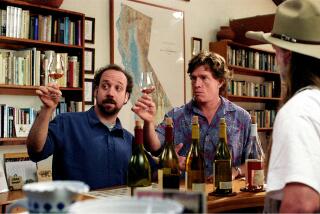Will This ‘Blush’ Make Wine Makers See Red?
A Michigan winery has released a wine called Whitezin that has only 10% Zinfandel in it.
O’Keefe Cellars, a second label of Chateau Grand Travers in Traverse City, Mich., produces a “blush” wine composed of 80% French Colombard, 10% Muscat Canelli and 10% Zinfandel. The wine is nonvintage and is made entirely from California grapes.
About 1,000 cases of O’Keefe Whitezin were produced, according to Ed O’Keefe, owner of the winery. He said the wine was introduced a few weeks ago with a retail price of $3.99 and it is available only in Michigan with a tiny quantity available in Minnesota.
O’Keefe, a former federal narcotics agent, said he has trademarked the term Whitezin, which he called a fanciful name. He said he’s not trying to put anything over on anyone because the percentages of grapes are listed on the label.
O’Keefe said he would have made a traditional White Zinfandel if he could, but “the quality of the Zinfandel grapes we were getting from New Mexico wasn’t very good, and I figured I could make a better blush wine by blending in other grapes.”
Bob Trinchero, president of Sutter Home Winery in the Napa Valley, the world’s largest producer of White Zinfandel wine, was surprised when told of the Michigan wine.
“Some years ago, we tried to use the term Whitezinfandel as one word and the BATF (Bureau of Alcohol, Tobacco and Firearms) said no,” Trinchero said. “They wanted us to use a hyphen between the white and the Zinfandel. “
Trinchero said he would check with BATF to see if Whitezin is a legal proprietary name.
Paribas Domaines USA, the U.S. subsidiary of a French banking group that already owns three Bordeaux properties, has acquired the William Wheeler Winery in northern Sonoma County in a deal industry sources said was worth about $4 million.
The transaction, completed earlier this month, won’t change operation of the winery, said Bill Wheeler, who founded the winery with his wife, Ingrid, in 1981.
Wheeler was named president and chief executive officer of Paribas Domaine USA Inc. The Wheelers continue to hold a minority interest in the winery.
The deal transferred the winery, brand, inventory, 30 acres of vineyards and 100 additional acres of unplanted land to Paribas’ parent company, Compagnie Financiere de Paribas. The firm also owns Chateau Rayne Vigneau in Sauternes and the red Bordeaux properties Chateau La Lagune and Chateau Grand Puy Ducasse in addition to Ayala Champagne.
Wheeler, who earned a post-graduate degree in economics and an MBA at Columbia University in New York City, acquired the Dry Creek Valley property in 1970. Today William Wheeler Winery markets 20,000 cases of wine.
California’s new health warning sign mandated for restaurants has begun appearing in eateries. It says, “Warning: Chemicals known to the state of California to cause cancer, or birth defects or other reproductive harm may be present in foods or beverages sold or served here.”
The Waterfront, a seafood restaurant in San Francisco, was one of the first to put up the sign, but appended at the bottom of one of the signs is an addendum that reads, “The management therefore discourages all reproductive behavior while eating or drinking on these premises.”
Dick Grace now is convinced that his wines travel well, and he tells a story to prove the point.
Grace, owner of a Napa Valley winery that makes a tiny amount of Cabernet Sauvignon, had donated a collection of engraved bottles of his wine for the Napa Valley Wine Auction, where the collection sold for $42,000.
An identical lot of wine was set aside for the Sun Valley Wine Auction and was in the back seat of Grace’s car a few weeks ago when he stopped his car at an Oakland barbecue stand to pick up some ribs for that evening’s dinner.
Afraid that the wine might overheat, Grace left the engine and the air-conditioning running while he picked up the ribs. Seconds later, someone had driven off with the unprotected car.
Grace gave chase in a pickup truck of a passer-by, and he used the truck’s cellular phone to tell Oakland police the route of the fleeing car. But after a chase through Oakland city streets, Grace’s car disappeared, so he went back to the police station to fill out a report. There, he learned his car was fine and the culprit was in custody.
The car, speeding down a Vallejo street at 70 miles an hour, was spotted by Vallejo plainclothesmen, who gave chase. The driver of the stolen car panicked, spun the car out and the engine died. One officer then leaped through the open sunroof and on top of the driver.
“The car was insured, so I knew I could get another one of those, but at that point, the only thing I cared about was the wine,” said Grace. “I couldn’t replace that.”
The wine was undamaged.
The 13th national conference of the Society of Wine Educators is scheduled for Aug. 4 to 6 at the Sheraton Long Beach Hotel. Daily sessions are open to the public for a fee of $120, which includes lunch, dinner and seminars.
Among the speakers scheduled for the conference are Dr. Paul Saltman of the University of California at San Diego, Peter M.F. Sichel of H. Sichel & Sohne, and a host of wine makers from various regions of California.
For details on the conference, contact Burt Wuttken at (213) 454-9331.
More to Read
Eat your way across L.A.
Get our weekly Tasting Notes newsletter for reviews, news and more.
You may occasionally receive promotional content from the Los Angeles Times.










